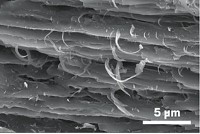Advertisement
Grab your lab coat. Let's get started
Welcome!
Welcome!
Create an account below to get 6 C&EN articles per month, receive newsletters and more - all free.
It seems this is your first time logging in online. Please enter the following information to continue.
As an ACS member you automatically get access to this site. All we need is few more details to create your reading experience.
Not you? Sign in with a different account.
Not you? Sign in with a different account.
ERROR 1
ERROR 1
ERROR 2
ERROR 2
ERROR 2
ERROR 2
ERROR 2
Password and Confirm password must match.
If you have an ACS member number, please enter it here so we can link this account to your membership. (optional)
ERROR 2
ACS values your privacy. By submitting your information, you are gaining access to C&EN and subscribing to our weekly newsletter. We use the information you provide to make your reading experience better, and we will never sell your data to third party members.
Materials
Flexibility Contributes To Fish Scales’ Toughness
X-ray scattering analysis reveals the basis of piranha-resistant fish armor
by Mitch Jacoby
October 21, 2013
| A version of this story appeared in
Volume 91, Issue 42
Arapaima gigas is one tough fish. So tough, in fact, that the scales on this Amazon Basin freshwater fish protect it from the powerful jaws of snapping piranhas. How these scales serve as natural dermal armor has eluded scientists. Robert O. Ritchie of Lawrence Berkeley National Laboratory and the University of California, Berkeley, and coworkers designed an experiment in which they probed the scales’ microstructures via a synchrotron-based X-ray scattering method while subjecting the scales to various types of mechanical forces (Nat. Commun. 2013, DOI: 10.1038/ncomms3634). The team found that the scales consist of a hard mineralized outer shell and an inner core of micrometer-sized collagen fibrils arranged in a unique pattern of twisted lamellae (bundles of fibrils). As force is applied to the scales, the lamellae reorient but not in a uniform way. Some of the bundles deform along the direction of applied force through stretching and sliding motions. Others rotate away from that direction and are compressed. The team explains that the concerted motions enhance the scales’ ductility and toughness, which prevent penetration and fracture but do not impair flexibility.





Join the conversation
Contact the reporter
Submit a Letter to the Editor for publication
Engage with us on Twitter